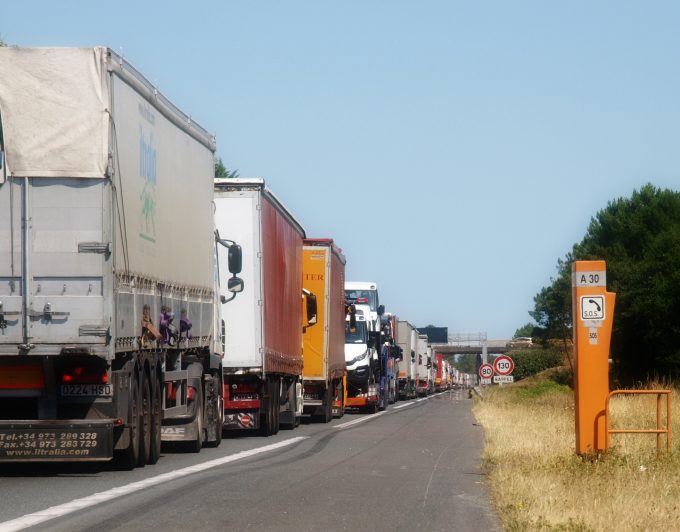UK stowaway rule risks collapsing haulage sector
Stakeholders are calling on the government to change migration rules that have caused a “significant” rise in ...

The UK government’s National Audit Office has cast severe doubt on the ability of the Declaration System (CDS), currently being developed, to handle the 255m declarations per year it is projected to need to process in a post-Brexit UK.
The CDS was originally conceived to replace Customs’ existing CHIEF system following the introduction of the EU’s Union Customs Code, which has an implementation deadline of 2020.
However, given that the UK is currently scheduled to leave the EU in March 2019, this deadline has been brought forward, and the NAO warned that unless there is smooth transition of customs regimes, there would be little guarantee the new system will be able to cope with the increased number of declarations that will have to be filed once a new border is created between the UK and Europe.
And the stakes are high – annually CHIEF collects around £34bn in tax and duty on imports from countries outside the EU; last year it processed 55m import and export declarations. The NAO said some £700bn of goods crossed the UK border in 2015.
While NAO executives admitted that HMRC appears well aware of the risks, it warned that the government is likely to have to offer it a lot more support, especially since there is only a two-month window between its scheduled introduction in January 2019 and Brexit.
Sir Amyas Morse, head of the National Audit Office, said: “HMRC has made progress in developing the new customs system, which was part of its existing programme, but it may need to be ready much earlier than originally planned if there is no agreement extending timescales on the transition to any new customs arrangements.
“Customs problems have obvious implications for the flow of goods in and out of the UK, so government as a whole needs to decide whether the extra cost and effort of getting a working system in place for day one is an insurance premium worth paying,” he said.
He added that the IT system for import and export declarations threatened to become “a horror show”.
However, some believe that the existing CHIEF system has the capability to handle post-Brexit trade requirements.
Peter MacSwiney, chairman of software developer Agency Sector Management (ASM) and co-chair of the Joint Customs Consultative Committee’s (JCCC) Brexit working group told The Loadstar: “I think a lot of this noise is a bit of a red herring. I truly believe the customs systems will be OK when Brexit takes place – CHIEF will continue to function; freight forwarders will be able to adapt because they always do and I’m confident that they will have something worked out. But wider business – the importers and exporters? Forget it. They will not be ready for Brexit, whatever system is being used.”
It is estimated by the NAO that if the UK leaves the customs union as many as 180,000 importer and exporters will need to make customs declarations – the very group that Mr MacSwiney is concerned about.
“The trouble is that the whole Brexit process is such a shambles that it’s impossible for anyone to properly plan for it – at the JCCC we have been asking ourselves what we need to do to limit the damage once Brexit takes place, and since the election we have no answer for that.”
And Mr MacSwiney suggested that the road freight sector is likely to be hardest hit.
“If you take the air freight sector, it is all structured around air waybills and is a very ordered process that is the same across the world. In ocean freight there is a bit more variance but it is still fairly standard.
“But in road freight you’ve got nothing, and they will have to devise some common documentation because the last thing you want is different trucking companies talking about the same thing in different terms.”
Freight Transport Association (FTA) deputy chief executive James Hookham called for both government and industry to prepare better for the implementation of a new customs regime: “With only two months anticipated between the delivery of the CDS programme and the UK’s departure from the EU, it is imperative that all the potential problems have been ironed out in the system before implementation.
“Without assurances that the rigorous stress tests recommended by the NAO have been undertaken, to ensure the Customs system can cope with the high volumes of traffic it will be handling, HMRC will be creating unnecessary uncertainty for British businesses, at a time stable trading conditions will be vital for our economy.
“There is no mention of how exporters and importers, their agents and their carriers will be trained in time to make this a smooth transition to Keep Britain Trading.
“It is irresponsible to suggest that a programme like CDS can be introduced overnight, and it is vital that the government and its negotiators do not leave business on a cliff edge, with no deal agreed at the UK’s point of departure from the EU. Britain’s economy needs a transitional period to ensure that Customs declarations can be moved to a new handling system in a controlled and managed method. To do otherwise could be disastrous for the UK,” he said.
Comment on this article